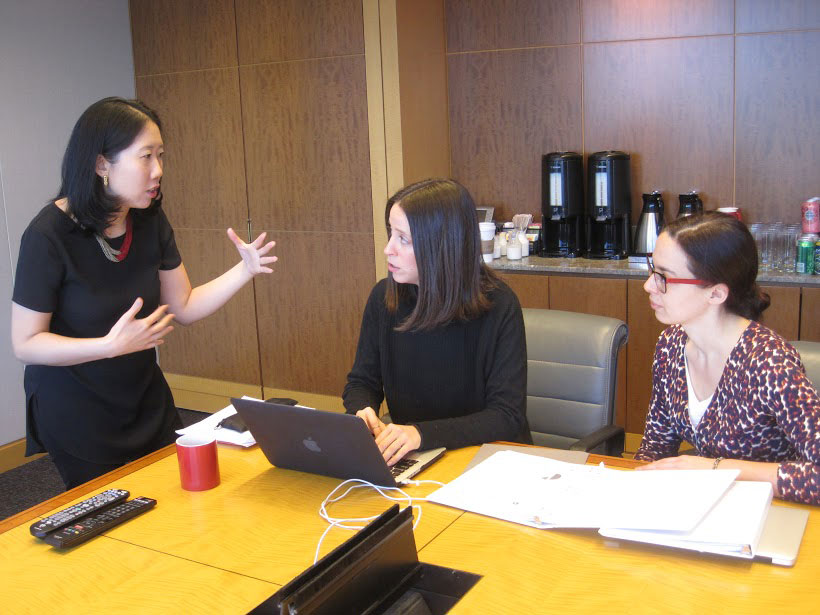This small business is helping women get into the angel investing game
Sponsor content from HP
A free daily email with the biggest news stories of the day – and the best features from TheWeek.com
You are now subscribed
Your newsletter sign-up was successful

Here's a statistic that Angela Lee would like people to know: In 2012, only 13 percent of angel investors were women.
Lee, an assistant dean at Columbia Business School, had been involved in angel investing for about five years when she decided to do something about that. So, that same year, she launched 37Angels, a company designed to help women get more involved in funding startups and other entrepreneurs.
"I was interested in investing alongside women, but I wanted to invest in both female- and male-led companies," said Lee. “What we’re doing is building a network and providing education for women who want to get more involved.”
The Week
Escape your echo chamber. Get the facts behind the news, plus analysis from multiple perspectives.

Sign up for The Week's Free Newsletters
From our morning news briefing to a weekly Good News Newsletter, get the best of The Week delivered directly to your inbox.
From our morning news briefing to a weekly Good News Newsletter, get the best of The Week delivered directly to your inbox.
Her goal? To close the gap so women account for 50 percent of angel investors. By bringing more women into the field, Lee's hope is that more of the money flowing to startups will go to female entrepreneurs.
Lee started 37Angels by herself, which meant she had to do everything from build the website to create the marketing strategy to make photocopies and order the food for events.
“It was a pretty typical startup beginning," Lee said. “But, it was fun. When you’re physically building the company from the ground up, it can be really exciting.”
Four months later, she hired her first employee — an investment associate who could help Lee research between 2,000 to 2,500 companies to see which might turn out to be high-potential investment opportunities. Today, 37Angels has 10 employees and dozens of mentors in a network that’s diverse both in terms of geography and industries represented.
A free daily email with the biggest news stories of the day – and the best features from TheWeek.com
To help women jump into angel investing, 37Angels offers a small-group, intensive bootcamp that offers training in how to select and value early-stage startups. And, the company holds pitch forums five times a year to connect these investors with fledgling entrepreneurs who show promise.
Going forward, Lee hopes to expand 37Angels from a company focused on business-to-business transactions into one that also has a business-to-consumer component. To that end, she’s working with large firms to develop a program that will help them retain their senior female executives.
“There has been tremendous interest from corporations to train their female leaders,” Lee said, though exactly what that course would look like is still up in the air. “We hope to create a program that helps them do just that.”
As Lee points out, there are several ways to define success for her company. Today, roughly 18 percent of angel investors are women, though Lee is quick to share the credit for that increase with other organizations. But perhaps, more important than the numbers, is the sense of community that 37Angels has fostered.
“We're one of the brands you think of when you think of women investors,” she said. “People are talking about this issue now and doing something about it. We're part of a bigger movement.”
-
 ‘The mark’s significance is psychological, if that’
‘The mark’s significance is psychological, if that’Instant Opinion Opinion, comment and editorials of the day
-
 How did ‘wine moms’ become the face of anti-ICE protests?
How did ‘wine moms’ become the face of anti-ICE protests?Today’s Big Question Women lead the resistance to Trump’s deportations
-
 Currencies: Why Trump wants a weak dollar
Currencies: Why Trump wants a weak dollarFeature The dollar has fallen 12% since Trump took office
-
 Epstein files topple law CEO, roil UK government
Epstein files topple law CEO, roil UK governmentSpeed Read Peter Mandelson, Britain’s former ambassador to the US, is caught up in the scandal
-
 Iran and US prepare to meet after skirmishes
Iran and US prepare to meet after skirmishesSpeed Read The incident comes amid heightened tensions in the Middle East
-
 Israel retrieves final hostage’s body from Gaza
Israel retrieves final hostage’s body from GazaSpeed Read The 24-year-old police officer was killed during the initial Hamas attack
-
 China’s Xi targets top general in growing purge
China’s Xi targets top general in growing purgeSpeed Read Zhang Youxia is being investigated over ‘grave violations’ of the law
-
 Panama and Canada are negotiating over a crucial copper mine
Panama and Canada are negotiating over a crucial copper mineIn the Spotlight Panama is set to make a final decision on the mine this summer
-
 Why Greenland’s natural resources are nearly impossible to mine
Why Greenland’s natural resources are nearly impossible to mineThe Explainer The country’s natural landscape makes the task extremely difficult
-
 Iran cuts internet as protests escalate
Iran cuts internet as protests escalateSpeed Reada Government buildings across the country have been set on fire
-
 US nabs ‘shadow’ tanker claimed by Russia
US nabs ‘shadow’ tanker claimed by RussiaSpeed Read The ship was one of two vessels seized by the US military